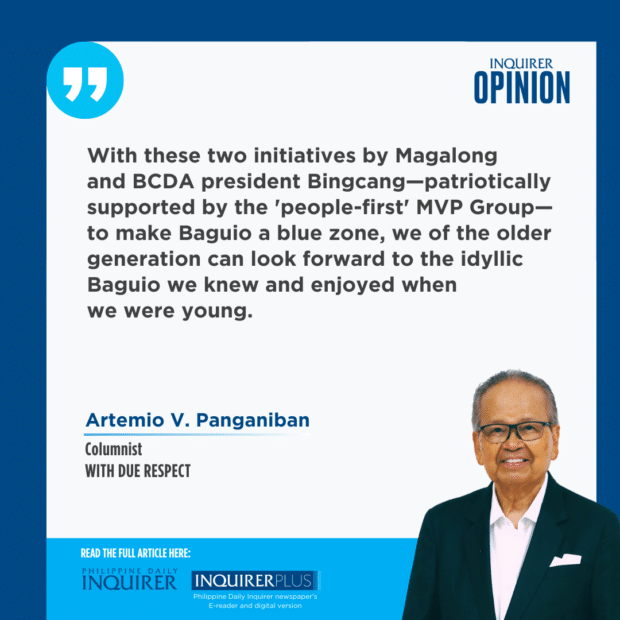Rejuvenating Baguio

In my last four columns, I wrote about rejuvenating humans via stem cell therapy. Let me now discuss the rejuvenation of my old-time favorite Baguio City. During the ’50s and ’60s when most readers were not yet born, we of that generation considered Baguio as the ultimate vacation spot in our country. We loved the pristine scent of pine trees lingering all over the city; we liked rowing small boats in the crystal-clear water of Burnham Park; we enjoyed strolling along Wright Park listening to chirping birds; we marveled viewing the rolling green mountains—reminiscent of “The Sound of Music”—in Mines View Park. Sadly, all that are gone in just half a century. All that are left are the obfuscating exhaust of motor vehicles in crowded, traffic-choked streets, scalded mountains and murky waters.
THE GOOD NEWS HOWEVER IS THAT Baguio Mayor Benjamin Magalong wants to rejuvenate the City of Pines with Singapore as the model. Why Singapore? Because it is the only urban location that has successfully attained—through systemic urban planning—the “Blue Zone” status that characterized rural places like Sardinia (Italy), Okinawa (Japan), Nicoya (Costa Rica), Ikaria (Greece), and Loma Linda (United States) where people enjoy longer, healthier, and happier lives. More centenarians live there than anywhere in the world.
All these rural blue zones boast of habitual health habits like walking through winding, rolling roads, eating balanced diets (the Mediterranean by the Italians), having a purpose-driven life (ikigai by the Japanese), ceasing to eat when 80 percent full, and social interaction by all the blue zone residents.
Conventional wisdom says that these habits were born from centuries of tradition and practice that could not just be implanted in a highly urbanized area. Nonetheless, Singapore has by law and regulation successfully aped them. It imposed fees for motor vehicles entering the city center during peak hours to reduce traffic and installed an adequate and comfortable system of trams that crisscross the city, making it cheaper and more convenient to travel by tram than by car. In fact, cars are discouraged by high taxes and limited availability to only one unit per person.
It encouraged the building of green buildings via less taxes and the granting of more government incentives. Due to limited land, it developed a system of apartment structures that fosters coexistence among different social sectors.
A SECOND GOOD NEWS IS THE 31-PAGE SUPREME COURT DECISION (BCDA v. CJH Development, April 3, 2024, per J Japar B. Dimaapao, en banc, 15-0) upholding an arbitral ruling ordering the CJH Development Corp. to vacate a 247-hectare portion of the John Hay Special Economic Zone it leased from the Bases Conversion Development Authority (BCDA).
Guided by an earlier case (Adapon v. Medical Doctors, June 14, 2021, per Associate Justice Marvic MVF Leonen, Third Division), the Court held that “as a rule, the arbitrator’s award cannot be set aside for mere errors of judgment either as to the law or as to the facts. Courts are generally without power to amend or overrule merely because of disagreement with matters of law or facts determined by the arbitrators. They shall not review the findings of law and fact contained in an award and will not undertake to substitute their judgment for that of the arbitrators. A contrary rule would make an arbitration award the commencement, not the end, of litigation.
“Errors of law and fact, or an erroneous decision on matters submitted to the judgment of the arbitrators, are insufficient to invalidate an award fairly and honestly made. Judicial review of an arbitration award is, thus, more limited than judicial review of a trial.”
This Adapon ruling is significant not only because it was the basis of the decision in the present case but also because the Court en banc affirmed the validity and enforceability of arbitral awards.
A THIRD GOOD NEWS IS THE MVP GROUP’S commitment through its subsidiary, Landco Pacific Corp., to the interim management of The Manor and Forest Lodge including the CAMP-John Hay Trade and Cultural Center to help the BCDA transition the properties to a new private partner once they are ready to be awarded through long-term leases and management arrangements.
For his part, BCDA president and CEO Joshua M. Bingcang “welcome[d] the support of the MVP Group and [BCDA] is grateful to navigate this transition with the confidence of their civic ethos and corporate muscle.”
With these two initiatives by Magalong and BCDA president Bingcang—patriotically supported by the “people-first” MVP Group—to make Baguio a blue zone, we of the older generation can look forward to the idyllic Baguio we knew and enjoyed when we were young.
On the other hand, the young can visit and/or reside in blue zone Baguio free of pollution, congestion, filth, and decay. They can smell the crisp scent of pines, enjoy the crystal-clear water of Burnham and look forward to living a healthy, happy, and purpose-driven life till 100 and beyond. It is like infusing the autologous needles and injecting the living cell therapy into an aging city to rejuvenate, refresh, and reengineer it to a fresh new start. Mabuhay!
—————
Comments to chiefjusticepanganiban@hotmail.com
















